'Badger Bounce Back Plan:' 14-day decrease in COVID-19 cases required before state can reopen
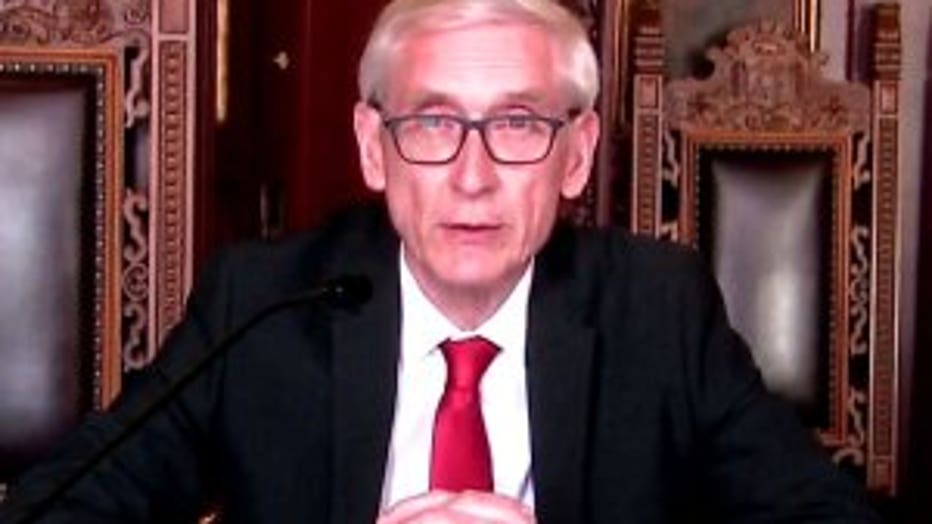
Gov. Tony Evers
MADISON -- Gov. Tony Evers issued an order Monday spelling out the criteria that must be met before schools and businesses can reopen in the state amid the coronavirus pandemic.
The plan envisions a phased reopening, triggered by a 14-day decline in positive COVID-19 cases, along with progress in bolstering testing, tracing and tracking of the pandemic, and acquiring more protective equipment for those on the front lines of fighting the virus.
There is no timeline for when businesses will be able to start to reopen under the plan, which largely mirrors federal guidelines released last week.
“Clearly if we could do it tomorrow, we would do it tomorrow,” Evers said. “The virus has never given us a timeline. ... No wants to reopen our economy as much as I do.”
Evers announced the plan amid growing criticism from businesses, Republican officeholders and residents who have organized protests arguing that the state should begin opening sooner than May 26 as the recently expanded stay-at-home order requires. The Tavern League of Wisconsin has called for reopening bars, restaurants and supper clubs starting May 1.
Evers was pessimistic about the chances of bars and restaurants opening by May 1, calling it a “tough row to hoe.”
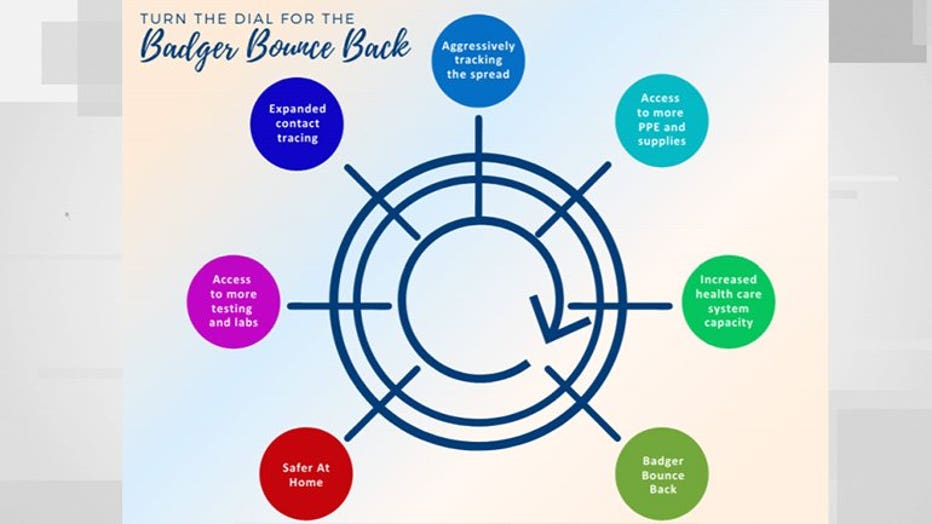
Republican lawmakers said they were considering filing a lawsuit to block the expanded safer-at-home order. The plan Evers released Monday has a clause that says if any one part of it is struck down, the others would remain in effect. That could be important if a lawsuit results in any one section of the order being undone.
“I am jazzed and hopeful about this plan," Evers said. "This plan is an all-out war on the virus.”
But Republican Rep. John Nygren, co-chair of the Legislature's budget committee, said the plan “misses the mark and does nothing to ease the minds and hearts of thousands of unemployed Wisconsinites.”
Republican Assembly Speaker Robin Vos said Evers' plan makes it harder to re-open the state, not easier.
“These are not criteria for reopening, they're roadblocks,” Vos said.
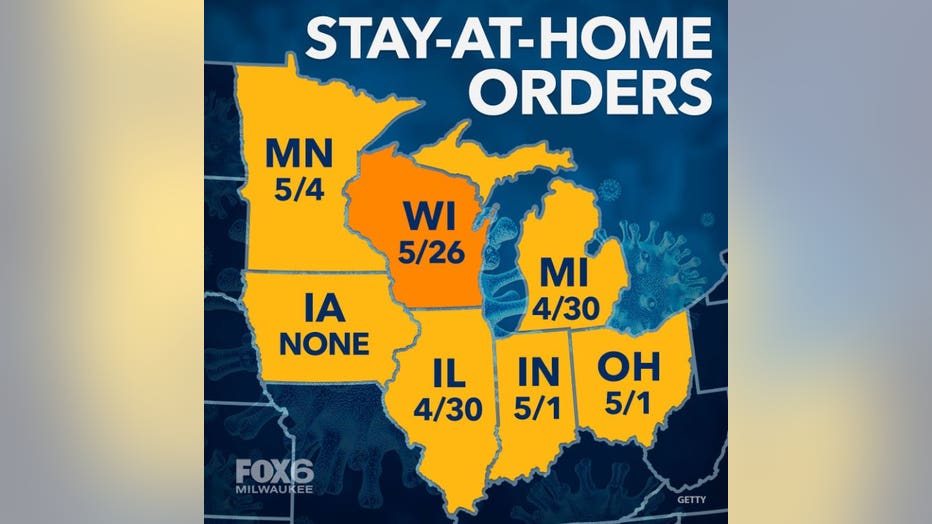
Under the plan, the state Department of Health Services will determine when it is appropriate to progress to each of three phases of reopening. In addition to seeing a 14-day decline in positive cases as a percentage of total tested, there must also be progress in increasing testing; tracing those who are infected; tracking the pandemic; acquiring personal protective equipment for health care and public safety agencies; and ensuring health care facilities have capacity for a surge.
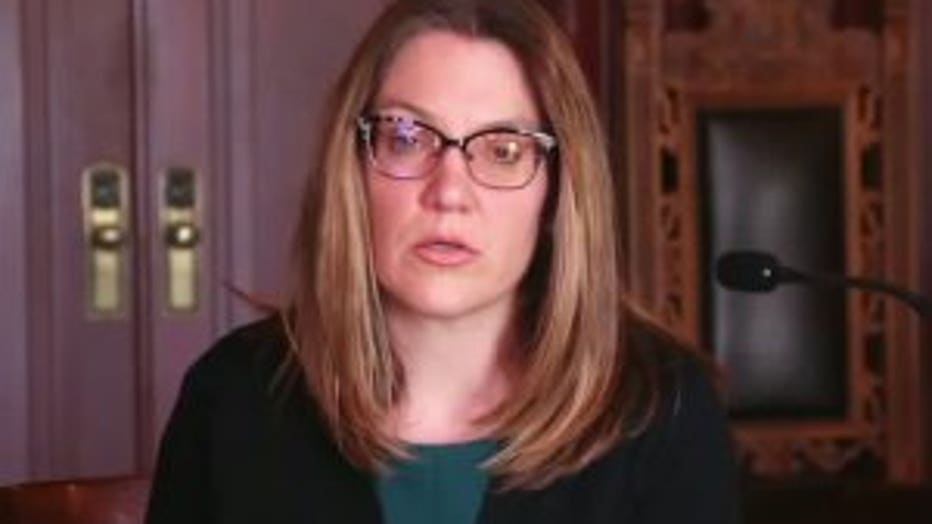
Department of Health Services Secretary Andrea Palm
The state has about 150 people tracking down those who have had contact with someone who tested positive, said Department of Health Services Secretary Andrea Palm. The plan calls for hiring an additional 1,000 people to do that contract tracing work.
Wisconsin has increased its testing capacity from two labs processing a few hundred tests a day to 36 labs processing more than 7,500 tests daily. The plan sets a goal of doing 12,000 tests a day and about 85,000 a week.
Under the first phase, gatherings of up to 10 people would be allowed, K-12 schools could resume in-person operations, child care settings could resume full operation and restaurants could reopen with social distancing requirements.
Under the second phase, mass gatherings of up to 50 people would be allowed, colleges and universities could resume in-person classes and bars and other nonessential businesses could reopen.
Under the third phase, all business activity and gatherings would resume with minimal preventative measures.
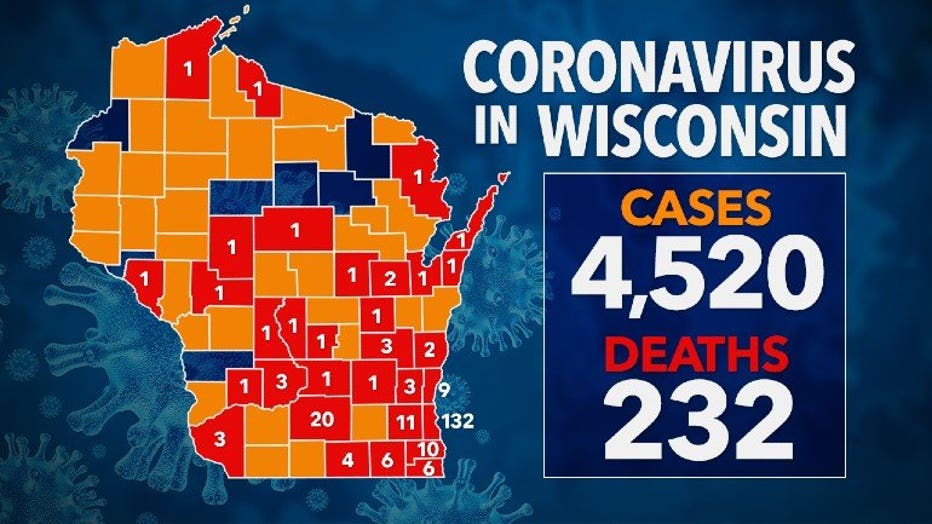
Dr. Ryan Westergaard, the state's chief medical officer for infectious diseases, said the number of new cases has been relatively flat the past two weeks.
The new coronavirus causes mild or moderate symptoms for most people, but for some, especially older adults and people with existing health problems, it can cause more severe illness or death. To date, 230 people have died in Wisconsin and nearly 4,500 have tested positive.
There are no signs yet of a surge in cases from the April 7 election as some feared, Palm said.
There is an outbreak of cases at the JBS Packerland meat processing plant in Green Bay. Brown County Health Department spokesman Ted Shove said the exact number of cases at the plant that employs around 800 people wasn’t known and it was not shutting down production.
The state sent about 2,200 test collection supplies to Green Bay to help test workers at the plant.
JBS USA spokesman Cameron Bruett issued a statement that didn’t refer specifically to the Green Bay plant, but said the company “will not operate a facility if we do not believe it is safe or if absenteeism levels result in our inability to safely operate.”
The virus has led to the shut down of meat processing plants elsewhere, including a JBS facility in neighboring Minnesota.
The Badger Bounce Back plan in brief is also available here.
Waukesha County Executive Paul Farrow issued the following statement on the "Badger Bounce Back" plan:
"Governor Evers’ new order makes it clear that he does not plan to open Wisconsin any time in the near future. Meeting the requirements outlined just to reach Phase One of his plan may be months away as they are impossible to meet with current testing capabilities, with no guidance on how the state will get the economy back on track.
“This plan continues to leave millions of struggling Wisconsin families in the dark about how their livelihoods will be protected while ignoring the common sense measures we can take to protect the physical and economic health of residents.
“Wisconsinites know the risks of the pandemic, but they also know the effect of losing their livelihood and economic security as a result of it. I am calling on Governor Evers to take a more aggressive approach to getting Wisconsin back to work.”

